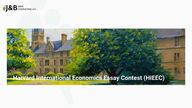
Return to flip book view
Message
• HUEA"is the primary undergraduate economics group at Harvard, founded in 2000#• HUEA Believes economics has much to contribute in making sense of the major issues that face our generation#• Through lectures, networking opportunities and competitions, HUEA seeks to engage the community in meaningful ways#• HUEA strives to create a more inclusive economics community at Harvard and beyondAbout the Harvard Undergraduate Economics Association
• The Harvard International Economics Essay Contest (HIEEC) is sponsored by the Harvard Undergraduate Economics Association (HUEA)#• This essay competition is open to high school students and provides the opportunity to demonstrate an accomplished level of writing and understanding of economic theory#• Through the contest, student competitors can hone their academic and professional skills and exhibit their knowledge to future employers and academic programs#• Competitors must construct a convincing argument using economic theory and real-world examples #• Essays should focus on argumentation supported with facts and references, although data-based support is also welcome#• Winning essays will be published on the website"and will be available for the greater Harvard community to readAbout the Harvard International Economics Essay Contest (HIEEC)
1)!Environment:!Carbon taxes have been implemented in many countries, including in Europe and the United States, and are considered to play a significant role in regulating greenhouse gas emissions. However, there are criticisms regarding this approach, such as the argument that it is not effective because enterprises may keep polluting as long as they pay the cost. Additionally, the competitive advantage of imported products from countries without carbon taxes raises questions about its effectiveness. What unique effects can be anticipated from carbon taxes compared to subsidies for renewable energy? To address the concerns currently raised about carbon taxation, what potential alternatives could be considered?#2)!Inequality:"Consider a country where income taxes are used to address socioeconomic inequality by taxing a portion of citizens' earnings, typically in a way that is proportional to income. Now, imagine that this government is debating a policy shift that would eliminate income taxes for all employed persons, replacing them with a new consumption tax on goods and services, proportional to the value of each item purchased. Analyze the potential short-term and long-term economic and social effects of this policy shift within this country, as well as possible impacts on its relationships with other nations. Would you recommend this approach as a viable alternative to income taxes? Additionally, consider how at least two different groups (e.g., high-income earners, retirees, unemployed persons) might view this policy change. Would they likely support or oppose it, and why?2024-2025 Essay Prompts
3)!Workforce & Education:"As automation and technological advancements continue to reshape industries, the skill sets required in the workforce are rapidly changing. How should education systems adapt to prepare students for a future dominated by automation and artificial intelligence? Evaluate the potential economic impact of reorienting education around STEM fields versus soft skills and critical thinking. What changes can be made at both the policy and institutional levels to ensure a workforce that is resilient and capable of thriving in an automated world?#4)!Crypto/Finance:"With the rise of cryptocurrencies and the potential introduction of central bank digital currencies (CBDCs), the role of traditional central banks may undergo significant shifts. How might the widespread adoption of digital currencies affect monetary policy, financial stability, and global capital flows? Should central banks regulate or embrace these innovations? Discuss the potential benefits and risks of digital currencies for consumers, businesses, and governments, and analyze how monetary systems could evolve in response.2024-2025 Essay Questions Continued
• Entrants must choose one of the four prompts and write a response to it #• Essay has a strict limit of 1500 words #• Submission must be via the HUEA website and entrants are limited to submitting one essay with only the first submission being considered#• The essays will be judged by"the board of the HUEA, with the top 10 submissions being adjudicated by the esteemed Harvard professor and 2016 Economics Nobel Prize winner Oliver HartContest Rules
2022 One of 3 Winners: Ashwin Telang,"West Windsor-Plainsboro High School SouthPast Results
• Conduct in-depth research on an economic topic of interest#• Sharpen your analytical and writing skills#• Demonstrate an accomplished level of writing and understanding of economic theory#• Develop a stronger interest in economics #• Grow your skills in making well-reasoned argumentsWhy Should I Enter?
• January 5, 2025 #• The essay submission form will close strictly at 11:59 PM EST#•HUEA will be capping essay submissions at"200 submissions this year.#!Key Dates and Submission Information